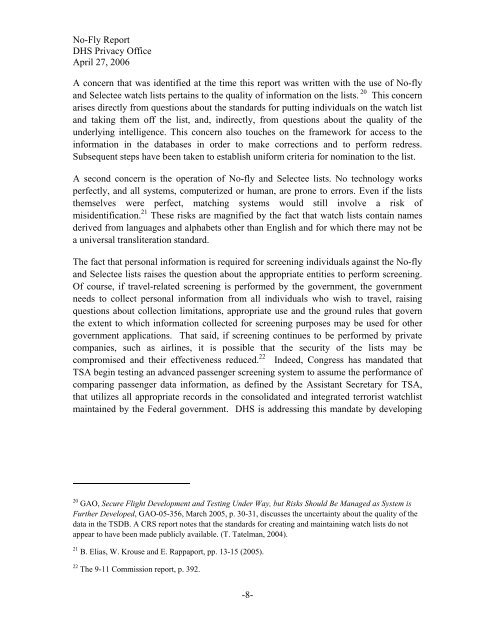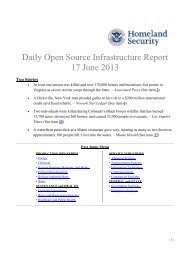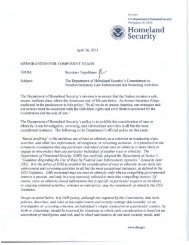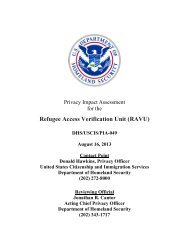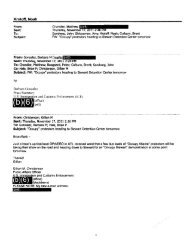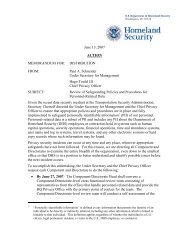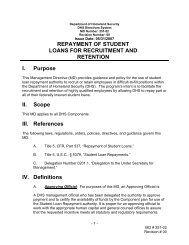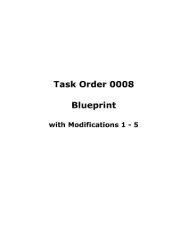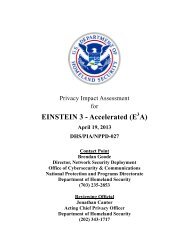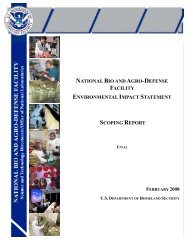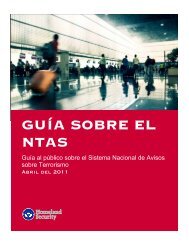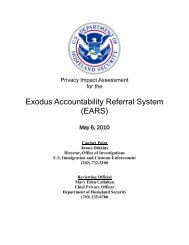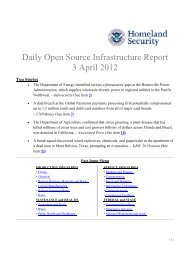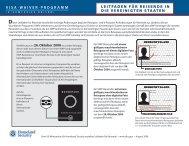Report: No Fly - Homeland Security
Report: No Fly - Homeland Security
Report: No Fly - Homeland Security
You also want an ePaper? Increase the reach of your titles
YUMPU automatically turns print PDFs into web optimized ePapers that Google loves.
<strong>No</strong>-<strong>Fly</strong> <strong>Report</strong><br />
DHS Privacy Office<br />
April 27, 2006<br />
A concern that was identified at the time this report was written with the use of <strong>No</strong>-fly<br />
and Selectee watch lists pertains to the quality of information on the lists. 20 This concern<br />
arises directly from questions about the standards for putting individuals on the watch list<br />
and taking them off the list, and, indirectly, from questions about the quality of the<br />
underlying intelligence. This concern also touches on the framework for access to the<br />
information in the databases in order to make corrections and to perform redress.<br />
Subsequent steps have been taken to establish uniform criteria for nomination to the list.<br />
A second concern is the operation of <strong>No</strong>-fly and Selectee lists. <strong>No</strong> technology works<br />
perfectly, and all systems, computerized or human, are prone to errors. Even if the lists<br />
themselves were perfect, matching systems would still involve a risk of<br />
misidentification. 21 These risks are magnified by the fact that watch lists contain names<br />
derived from languages and alphabets other than English and for which there may not be<br />
a universal transliteration standard.<br />
The fact that personal information is required for screening individuals against the <strong>No</strong>-fly<br />
and Selectee lists raises the question about the appropriate entities to perform screening.<br />
Of course, if travel-related screening is performed by the government, the government<br />
needs to collect personal information from all individuals who wish to travel, raising<br />
questions about collection limitations, appropriate use and the ground rules that govern<br />
the extent to which information collected for screening purposes may be used for other<br />
government applications. That said, if screening continues to be performed by private<br />
companies, such as airlines, it is possible that the security of the lists may be<br />
compromised and their effectiveness reduced. 22 Indeed, Congress has mandated that<br />
TSA begin testing an advanced passenger screening system to assume the performance of<br />
comparing passenger data information, as defined by the Assistant Secretary for TSA,<br />
that utilizes all appropriate records in the consolidated and integrated terrorist watchlist<br />
maintained by the Federal government. DHS is addressing this mandate by developing<br />
20 GAO, Secure Flight Development and Testing Under Way, but Risks Should Be Managed as System is<br />
Further Developed, GAO-05-356, March 2005, p. 30-31, discusses the uncertainty about the quality of the<br />
data in the TSDB. A CRS report notes that the standards for creating and maintaining watch lists do not<br />
appear to have been made publicly available. (T. Tatelman, 2004).<br />
21 B. Elias, W. Krouse and E. Rappaport, pp. 13-15 (2005).<br />
22 The 9-11 Commission report, p. 392.<br />
-8-


